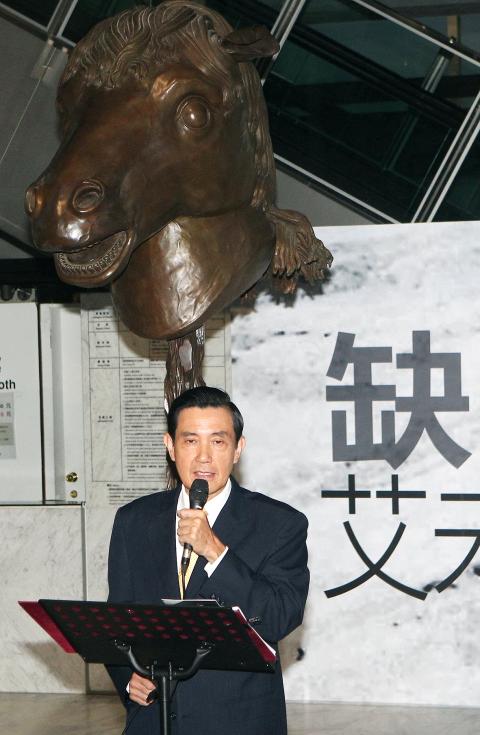President Ma Ying-jeou (馬英九) yesterday called for China to respect human rights and defended Chinese dissident artist Ai Weiwei’s (艾未未) right to freedom of expression as he attended an exhibition of Ai’s work at the Taipei Fine Arts Museum.
Dubbed “Ai Weiwei, Absent,” the exhibition features 21 of Ai’s works, including photographs, installation pieces, videos, 12 bronze heads representing Chinese zodiac symbols and a new piece consisting of about 1,000 bicycles.
Ma praised the diversity, deep emotions and reflections on Chinese society shown in Ai’s artwork and installation pieces, such as a surveillance monitor made of marble, a comment on Ai’s life under the Chinese government’s scrutiny, and said it highlighted the difference between Taiwan and China.

Photo: Hu Shun-hsiang, Taipei Times
“In Taipei, local borough chiefs and residents urged the city government to install surveillance monitors as a public safety measure. It is an interesting observation of how monitors here are rarely used as a tool for the violation of human rights,” he said.
Defending his efforts to press China on improving human rights, Ma said he urged the Chinese government to release Ai and Chinese dissident Liu Xiaobo (劉曉波) in his statement on the 22nd anniversary of China’s Tiananmen Square Massacre on June 4, urging China to respect human rights as a way to promote cross-strait relations.
“The distance between Taiwan and the Mainland depends on the two sides’ views on the protection of human rights. The more similarities we share on the issues of human rights, the closer that distance will become,” Ma said.
In a written statement this year marking the Tiananmen Square Massacre, Ma urged the Chinese authorities to release Liu, Ai and other Chinese dissidents, and called on China to “undertake political reforms and promote the development of freedom, democracy, human rights and the rule of law.”
Ai, an outspoken critic of the control the Chinese Communist Party exerts over Chinese society and censorship in the country, was imprisoned in April on his way to Beijing airport for a planned trip to Taiwan.
He was released in June after almost three months of detention that sparked outrage worldwide.
He is currently being investigated for tax evasion and has been prohibited from leaving the country.
Pan-green lawmakers have accused the Taipei City Government and the museum of failing to help Ai visit Taiwan and attend his own exhibition, which began on Oct. 29 and runs through Jan. 29.
Ma yesterday defended the city government, saying Taipei Mayor Hau Lung-bin (郝龍斌) had invited Ai to attend the opening of the exhibition and the city government has never had a problem with Ai visiting Taipei.
Accompanied by Taipei Department of Cultural Affairs Commissioner Cheng Mei-hua (鄭美華) and Taipei Secretariat Chen Yung-ren (陳永仁) at the exhibition, Ma spent about 15 minutes glancing over the works.
However, he passed over some of Ai’s well-known works, including Study of Perspective: Tiananmen Square, in which Ai gives the finger in front of the square.

The US government has signed defense cooperation agreements with Japan and the Philippines to boost the deterrence capabilities of countries in the first island chain, a report by the National Security Bureau (NSB) showed. The main countries on the first island chain include the two nations and Taiwan. The bureau is to present the report at a meeting of the legislature’s Foreign Affairs and National Defense Committee tomorrow. The US military has deployed Typhon missile systems to Japan’s Yamaguchi Prefecture and Zambales province in the Philippines during their joint military exercises. It has also installed NMESIS anti-ship systems in Japan’s Okinawa

‘WIN-WIN’: The Philippines, and central and eastern European countries are important potential drone cooperation partners, Minister of Foreign Affairs Lin Chia-lung said Minister of Foreign Affairs Lin Chia-lung (林佳龍) in an interview published yesterday confirmed that there are joint ventures between Taiwan and Poland in the drone industry. Lin made the remark in an exclusive interview with the Chinese-language Liberty Times (the Taipei Times’ sister paper). The government-backed Taiwan Excellence Drone International Business Opportunities Alliance and the Polish Chamber of Unmanned Systems on Wednesday last week signed a memorandum of understanding in Poland to develop a “non-China” supply chain for drones and work together on key technologies. Asked if Taiwan prioritized Poland among central and eastern European countries in drone collaboration, Lin

The Chien Feng IV (勁蜂, Mighty Hornet) loitering munition is on track to enter flight tests next month in connection with potential adoption by Taiwanese and US armed forces, a government source said yesterday. The kamikaze drone, which boasts a range of 1,000km, debuted at the Taipei Aerospace and Defense Technology Exhibition in September, the official said on condition of anonymity. The Chungshan Institute of Science and Technology and US-based Kratos Defense jointly developed the platform by leveraging the engine and airframe of the latter’s MQM-178 Firejet target drone, they said. The uncrewed aerial vehicle is designed to utilize an artificial intelligence computer

Renewed border fighting between Thailand and Cambodia showed no signs of abating yesterday, leaving hundreds of thousands of displaced people in both countries living in strained conditions as more flooded into temporary shelters. Reporters on the Thai side of the border heard sounds of outgoing, indirect fire yesterday. About 400,000 people have been evacuated from affected areas in Thailand and about 700 schools closed while fighting was ongoing in four border provinces, said Thai Rear Admiral Surasant Kongsiri, a spokesman for the military. Cambodia evacuated more than 127,000 villagers and closed hundreds of schools, the Thai Ministry of Defense said. Thailand’s military announced that